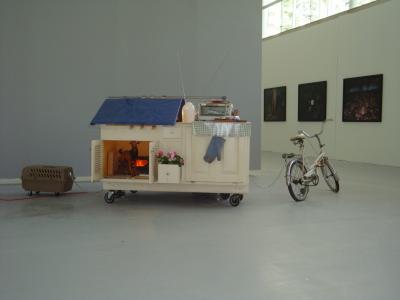Columbia College uses art boutique to help students self-promote. Should SAIC follow its lead?
By Shannon Race
Deciding to take your creative talents to a college level may have been a cinch several years ago … at least comparitively, with the only “cinch” today being in the strings of our coin purses, student artists are in more need of self-promotion than ever. But what if your school offered to sell your artwork? Many have, and continue to sell student work to others in the school and to the public. One of these genius storefronts can be found at the intersection of Wabash and Harrison, a creation of Columbia College.
A small, quaint space is the setting of a student artist’s dreams. Acting as an improvisational gallery, Columbia College’s Student Art Boutique aids their students in the selling and promotion of their artwork. However, although similar models continue popping up at art schools all over the country, SAIC has yet to pursue a comparable idea.
“Has [a student art boutique] been considered? Yes,” said Patrick Spence, SAIC’s Assistant Dean of Student Affairs for Campus Life. “We certainly looked into that idea, because we heard from students that it was something they were interested in.”
So far, the idea has been placed at the bottom of the list in terms of SAIC needs. But there are multiple reasons to facilitate a similar model, and Columbia College exemplifies why.
Started just two years ago, Columbia’s creation had taken most of its direction from Savannah College of Art and Design’s shopSCAD in Savannah, Georgia.
“The idea had been floating around campus for several years,” explained Ronda Dibbern, Student Art Boutique’s manager and a major team player in the creation of the space. Finally, with the right timing and support, Dibbern was able to get the idea in motion. With a sister living in Savannah, Dibbern found the perfect excuse, not only to visit, but also to “spy” on the boutique established by SCAD.
Dibbern liked what she saw — with just one exception. ShopSCAD focuses on selling work by students, faculty, staff, and alumni; and while there’s nothing wrong with that, Dibbern and others had a different idea.
“We are the only boutique that is student-focused,” Dibbern explained. Allowing only current undergraduate and graduate students to sell work in the boutique became the ingredient that set shopColumbia apart from any other model. According to shopColumbia, the boutique’s artists have brought in over $95.000 from the sale of their work.
These spaces, as Rhonda Dibbern, the Student Art Boutique’s manager, pointed out, are priceless. They offer students an experience that can prepare them for selling their work in the future.
Now, the question is posed to SAIC: why not follow in these footprints? SAIC graduate student Joel Parsons,thinks that the existence of such a “gallery” would not only be beneficial, but also educational. Parsons had not heard of shopColumbia, but grinned at the idea of SAIC implementing something similar.
Self-promotion is key for artists, says Parsons. “The biggest way [I promote myself] revolves around my website. I’ll then drive traffic there through Facebook and blogs that I’ve kept up. … I guess I primarily use social media attached to a website,” says Parsons.
“I think it would be good to see what the market value of my work would be, and also, any exposure is good exposure,” Parsons said. “I don’t really make work that’s marketable in a boutique setting, though I might be inclined to try if the option was available to me.”







